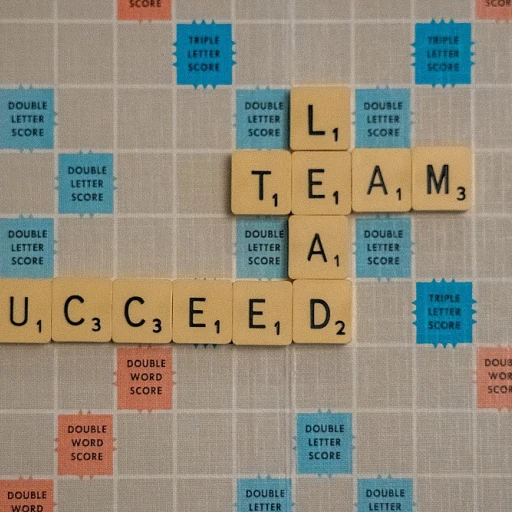
Understanding the Role of a Teammate
Understanding the Essence of Being a Team Player
A good team player is essential in any high performing group. The role of a great teammate goes beyond fulfilling individual responsibilities. It's about contributing to the collective success of the team. Understanding what makes a great teammate involves appreciating the importance of collaboration, mutual respect, and shared aspirations.- Collaboration and Support: Great teammates focus on how they can fill gaps within the team, providing support where it's needed, and stepping up when situations demand. This proactive approach helps to foster a positive environment where teamwork truly makes dream work.
- Respect and Communication: Effective communication is crucial in maintaining harmonious relationships among team members. A good teammate knows to listen as much as they contribute, paving the way for open dialogue and mutual respect among peers.
- Shared Goals: Harmony in a team often stems from a commitment to shared objectives. Successful teammates invest in the group’s goals as passionately as their own. They align their efforts with the overall vision, ensuring that they truly are contributing to team success.
Communication: The Backbone of Team Success
Clear Communication as the Key to Team Success
In any high-performing team, clear and open communication is fundamental. Great teammates excel in expressing their ideas and thoughts effectively, ensuring that team members are aware of what’s expected and where they stand in the project’s timeline. Good communication fosters trust, a vital element that helps teams overcome challenges together.
One striking aspect of successful communication is active listening. Great team players don’t just share their thoughts; they listen to understand others, which helps avoid misunderstandings and conflicts that can derail progress. By valuing diverse perspectives, teammates can fill gaps in their knowledge, making the entire team stronger.
Being transparent, especially in team roles and responsibilities, contributes significantly to teamwork's success. A good teammate will make sure expectations are clear, which reduces confusion and makes the team's work more efficient. For example, discussing progress with teammates helps keep everyone aligned with the shared goals of the group.
In team meetings or informal discussions, fostering an environment where team members feel comfortable sharing their ideas without fear of criticism is crucial. This openness signifies change leadership and sets a precedent for how communication should function in the team. It ensures that everyone feels heard, promoting a culture where collaboration thrives.
To summarize, communication is the backbone of any team's success. Good communication practices will not only aid in achieving shared goals but also enhance the overall work experience for all team members. When great teammates emphasize clear messaging and active listening, the result is a cohesive, effective, and engaged team where teamwork truly makes the dream work.
Empathy and Emotional Intelligence
Recognizing and Understanding Emotional Nuances
Empathy and emotional intelligence are what makes a good team tick. They form the bedrock of a high-performing team, allowing teammates to connect on a deeper level. These qualities fill the gap between mere cooperation and meaningful collaboration, where team members feel genuinely understood and valued. Understanding and recognizing the emotions of others don’t come naturally for everyone; however, great teammates exhibit a willingness to listen and learn, fostering an environment where all team members can thrive. This is especially important in performing teams, where diverse opinions and backgrounds converge.Building Strong and Trusting Relationships
The presence of empathy in a team helps build strong relationships, ensuring teammates don’t lose sight of the collective aim or the individual contributions that drive success. High levels of emotional intelligence help team members navigate through conflict and miscommunication effectively. In essence, empathy acts as a social glue that nurtures trust, a crucial foundation for teamwork.Unlocking True Leadership Potential
Leadership skills aren't about steering a team rigidly; they involve understanding emotional dynamics. Those who display empathy and emotional intelligence can seamlessly become a great team player. Such team members naturally fill leadership roles, guiding others to the shared vision seamlessly. Ultimately, fostering empathy and emotional intelligence in teams will help achieve the true essence of teamwork. Every good teammate recognizes the power of empathy and the role it plays in transforming individuals into a cohesive unit. To understanding the nuances of what lies beneath the surface, crafting meaningful words can be an effective practice. It offers insights on how sentiments are communicated beyond verbal exchanges.Adaptability and Problem-Solving Skills
Embracing Change and Overcoming Challenges
In the dynamic world of teamwork, adaptability and problem-solving skills are crucial for any good teammate. The ability to adjust to new situations and tackle unexpected challenges head-on is what makes a team member truly valuable. High-performing teams thrive on the flexibility of their members, and great teammates don’t shy away from change; instead, they embrace it as an opportunity for growth and innovation.
Adaptability is not just about going with the flow; it’s about actively engaging with change and finding ways to make it work for the team. This requires a mindset that is open to new ideas and a willingness to pivot strategies when necessary. Good team players understand that what worked yesterday might not work today, and they are ready to fill the gaps with creative solutions.
Problem-solving skills go hand in hand with adaptability. When challenges arise, great teammates don’t just point out the problems; they actively seek solutions. They leverage their leadership skills to guide the team through obstacles, ensuring that the team will continue to move forward. This proactive approach not only helps the team overcome immediate hurdles but also builds a culture of resilience and innovation.
Coaches and leaders play a vital role in fostering these qualities within their teams. By encouraging a culture of open communication and continuous learning, they help team members develop the skills needed to adapt and solve problems effectively. This, in turn, strengthens the team’s overall performance and contributes to achieving shared goals.
Ultimately, adaptability and problem-solving are about more than just individual success; they are about contributing to the collective success of the team. When team members are equipped to handle change and challenges, teamwork makes the dream work, and the team can achieve great things together.
Commitment to Shared Goals
Dedication to Collective Objectives
In performing teams, understanding and aligning with collective objectives plays a pivotal role in reaching success. A committed team player is essential, as their dedication not only inspires others but also keeps the entire group focused on shared goals. High performing teams recognize the importance of having members who possess an unwavering commitment to these objectives. A good team member consistently considers the bigger picture and how their individual actions align with team goals. This holistic approach helps ensure that everyone is pulling in the same direction, leading to seamless teamwork. Great teammates, by virtue of their leadership skills, can articulate shared purposes clearly, motivating teammates and coaches alike to push toward the finishing line. Here’s what makes a good teammate truly stand out:- Understanding Contributions: They know what is required of them and how their work affects the larger team efforts. This understanding is crucial in filling gaps and maintaining momentum.
- Putting Team Goals First: Good team players prioritize the team’s needs over personal ambitions. Their drive for success is linked to achieving team goals, not just individual accolades.
- Leading by Example: Team members who demonstrate relentless commitment serve as a motivational beacon. Their example helps foster a productive team culture where everyone feels compelled to bring their best to the table.













